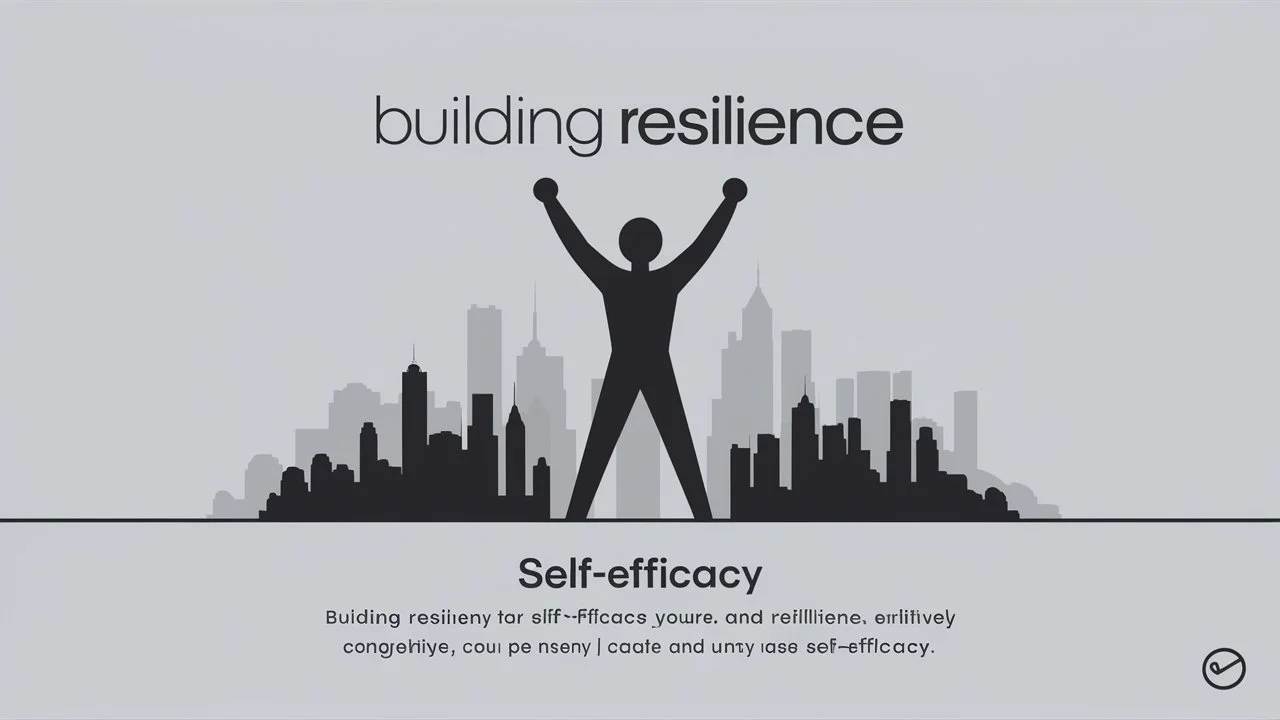Self-efficacy, which is a regularly used term in psychology as well as in self-esteem enhancement, stands for an individual’s perception of their proficiency in the completion of tasks and the achievement of goals. In a broad sense, it builds up a perception of persistence in the face of all obstacles and demarcates success in several domains. Beginning with a basic explanation of the self-efficacy concept and its impact on our lives, let’s see what’s behind our self-confidence.
Table of Contents
ToggleUnderstanding Self-Efficacy
Actualizing Self-Efficacy is a key to understanding its position in person’s everyday life and achievements. Self-efficacy is an individual’s perceived capacity to do what he or she believes to be the most effective actions in a given situation at a particular time with the goal of success in sight. It takes more than just the right skill set, it’s also the courage to be able to use the skills one possesses effectively.

Let’s break down this concept further:
Belief in Capabilities:
The core idea is that action confidence, or self-efficacy as it is referred to, is all about the belief an individual has that he or she is indeed capable of performing these tasks successfully, via the use of their skills, expertise, and assets. This truth is built on up on the previous success achievements, viewpoints, reviews, and cognitive judgement.
Influence on Behavior:
When we have a good self-efficacy, we are more likely to act, to do things. People with such high self efficacy participate more actively in the activities corresponding to the domain, set ambitious goals, spend considerable efforts, and these people also expect to handle any problem that might be faced.
Motivational Impact:
Building a belief in oneself is the key element that serves as a very strong a motivator. Proficiencies in self-efficacy are one of the factors accountable for an individual’s action of taking up difficult tasks and managing the whole process of obstacles until they grow to view failures as a learning opportunity. They own this thing to a huge extent, since their trust in their own strengths drives them further into the horizon of success.
Differentiation from Self-Esteem:
Despite the close connection to be described, they are not the same thing. The notion “self-esteem” is related to a general assessing of a person’s worthiness and value, while “self-efficacy” meaning “the confidence of an individual that they will be successful in any task that they perform or goal that they set”.
Development and Enhancement:
The self-efficacy is learnable, it can be developed all across the life span. Life circumstances and productive handling of mastery, feedback, social modeling, and cognitive restructuring are means that people can consolidate their self-efficacy beliefs and broaden their perceived capabilities.
In other words, the vital energy of self-efficacy should be understood clearly, as it manifests in behavior, motivation, and success. By cherishing and channeling this conviction into their lives, persons are able to explore their capabilities in the highest and also break through the difficulties on their way.
Origins of Self-Efficacy Theory
How the theory of self-efficacy of psychologist Albert Bandura can be seen as the historical basis lies in his trailblazing work. Being one of the central concepts of the Social Cognitive Theory, Bandura’s reciprocal determinism serves as a representation of the dynamic relationship between cognitive, behavioral, and environmental components of the human behavior.
Here’s a breakdown of the origins of Self-Efficacy Theory:Here’s a breakdown of the origins of Self-Efficacy Theory:
Albert Bandura's Contribution:
Albert Bandura, the popular psychologist, presented an important concept, that of self-efficacy, as part of his Social Cognitive Theory which was published around the 1970s. research aimed to show how individuals’ thoughts of self-capabilities affect their behaviors, expectations, and consequences.
Social Cognitive Theory:
As per Bandura’s social cognition theory, we learn things using modeling, observation, and emulating the activities performed by others. In his theory, he emphasized the role of cognitive operations, namely attention, memory, and motivation in connection with environmental settings and conduct.
Role of Self-Efficacy:
Inside the specifications of Social Cognitive Theory, self-efficacy accounted for the main route. Self-efficacy, according to Bandura, is the judgment that one can competently perform certain activities in which the desired results are possible to achieve. According to him, self-efficacy beliefs — those basic beliefs that people have about their abilities— are directly linked to the choices, efforts, and even the persistence they exhibit when facing adversity.
Influence on Behavior:
Bandura showed through his research that individuals having high self-efficacy are more likely to set a high standard and put in more effort despite facing difficulties, which will help them succeed in different aspects of their lives, such as academics, work, and sports. a low self-efficacy will likely manifest into a type of avoidance behaviors, loss of motivation, and the amount of their productivity will decline.
As a whole, Social Cognitive Theory and Albert Bandura’s, namely, investigation of the influence of people’s self-perception on their behavior are the roots of Efficacy Theory. Bandura’s theories made immense contributions to psychology, education, and other related fields with the clarified picture of the role visualization plays in the way people perceive and work through the limitations they see during the goal-setting process.
Key Components of Self-Efficacy
The notion of self-efficacy includes a number of components which collectively determine one’s ability to accept challenges and attain objectives. Knowing these parts is crucial to the proper understanding of how self-efficacy is realized and what tactics to use to grow and strengthen it. Here are the main components:Here are the main components:
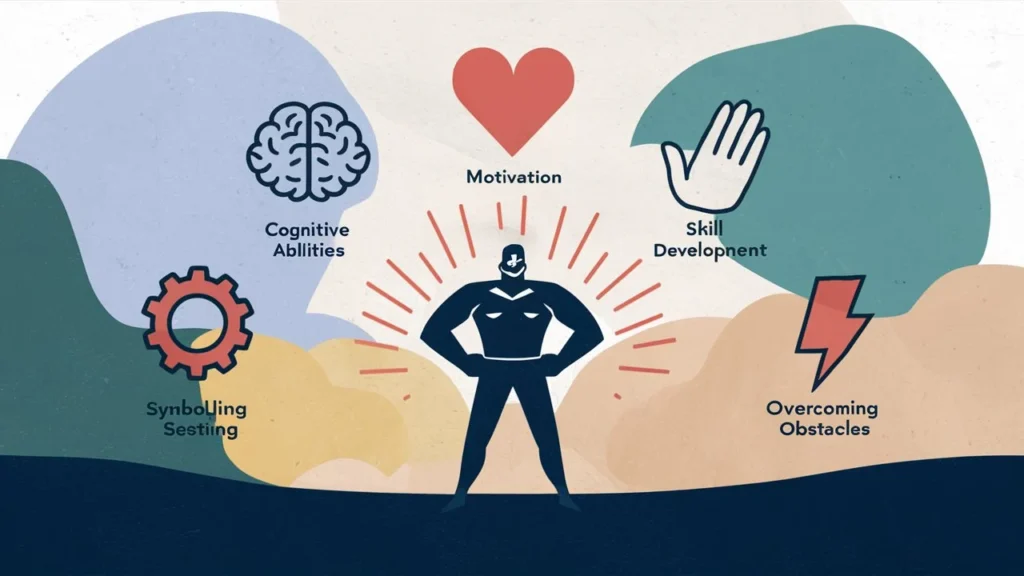
Mastery Experiences:
Experiences of competence involve successes gained and attained in related tasks or parallel conditions to the current one. Through these experiences, confidence is nurtured in participants as default their accomplishments. Great victories build confidence in their talent and lead to the determination that they can overcome challenges and reach goals or objectives.
Vicarious Experiences:
The vicarious experience consists in that we – while we observe peers doing activities that are acknowledged by us as their success – process this act as our achievement. Through own interaction with successful people, a person might adopt their approach, technique, and result, and therefore grow. Consequently, this person becomes exposed to failure. By observing others who are like yourself in accomplishing equivalent summits, self-assurance, and creation of motivation develops since these stand to show that attainment is possible.
Social Persuasion:
Social persuasion is when you get a shoutout, good remarks and an encouraging word from your peers. Make social persuasion a part of your social media strategy. Mentors, teachers, peers or family members can both verbally and non-verbally persuade individuals to boost such confidence. Likewise, the relational power of mentors is internalized, resulting in a person valuing themselves more. Also, in some cases, criticism or negative comment can be a factor leading to undermining of self-efficacy and this can happen if the criticism is not complemented with constructive guidance.
Emotional and Psychological States:
Human emotions and psychological traits are very decisive factors when building up self-esteem. Positive thoughts such as excitement, joy, and friendliness can strengthen self-efficacy by increasing the drive and the capacity for resilience. On the other hand, particularly feelings of fear, worry, and doubt can erode sense of self-efficacy by ruining self-confidence and making obstacles appearing more.
These components interact dynamically and function as a way in which individuals’ beliefs on their capabilities in different arenas of life are shaped. Self-efficacy can be developed to a greater extent through knowledge of the mechanisms of mastery experiences, vicarious experiences, social persuasion, and emotional states. There are many proactive approaches that people can use to reinforce the reinforcement of those factors in order to see and accomplish goals with more confidence and steadfastness.
Impacts of Self-Efficacy
The influence of self-efficacy is unquestionable, as it pervades these individuals’ personalities and areas of success starting with personal development, up to academics and professional life. Identifying these affects reveals an unseen degree of the profound function of self-efficacy in the shaping of behavior, motivation, and consequences. Here are some of the key impacts:

Personal Development:
The factor of self-efficacy is probably the most crucial in life development; it ensures a sense of agency, autonomy, and control by encouraging individuals to master their lives through their efforts. Those who believe in themselves (namely people with high self-efficacy) take bold steps in establishing high-level goals; they take proactive steps and move forward in self-improvement mechanisms, and they can deal with challenges (they can persevere through obstacles). Resiliency, self-assurance, and general well-being have all been found to be more prevalent as a result of this.
Academic Achievement:
IIt is no less evident that the self-efficacy has deep roots in students’ performance and success. Students of high self-efficacy tend to take on learning activity, keep on trying in the face of academic difficulty, and positively apply appropriate study strategies. They display a higher academic self-regulation which correlates to better academic outcome, including higher grades, increased satisfaction with their education, and a positive attitude toward learning for the rest of their lives.
Professional Success:
In the working environment, self-reliance is the main predictor of job performance, professional development, and work experience satisfaction. The employees who have a stable self-efficacy take up hard tasks more often. They are most likely to cope with the situation and make leaders. Also, they easily could adapt to changing environments of work. They exhibit greater confidence in skills and abilities which, in turn, result in their productivity, creativity, and engagement in jobs growing.
Health and Well-being:
Self-efficacy is a significant factor that has effects on health-autonomous behaviors and outcomes. Individuals with healthy self-beliefs about their power over their health will probably be more likely to use health behaviors, follow medical treatments, and be able to therefore cope with illness and injury successfully. They develop better physical health, of course, lower stress levels, and a better quality of life, due to the said reason.
interpersonal Relationships:
Efficacy can indeed be a source of qualitative interpersonal relationship development. People with high self-efficacy are more assertive, and communicative, thus, they can manipulate stressful situations more effectively and easily.
Developing Self-Efficacy
Producing self-efficacy requires planned actions to bolster one’s conviction in his or her ability to accomplish tasks and accomplish goals. Individuals can improve their sense of self-efficacy significantly through the application of some methods and approaches which allows them to deal with different problems in their daily life.
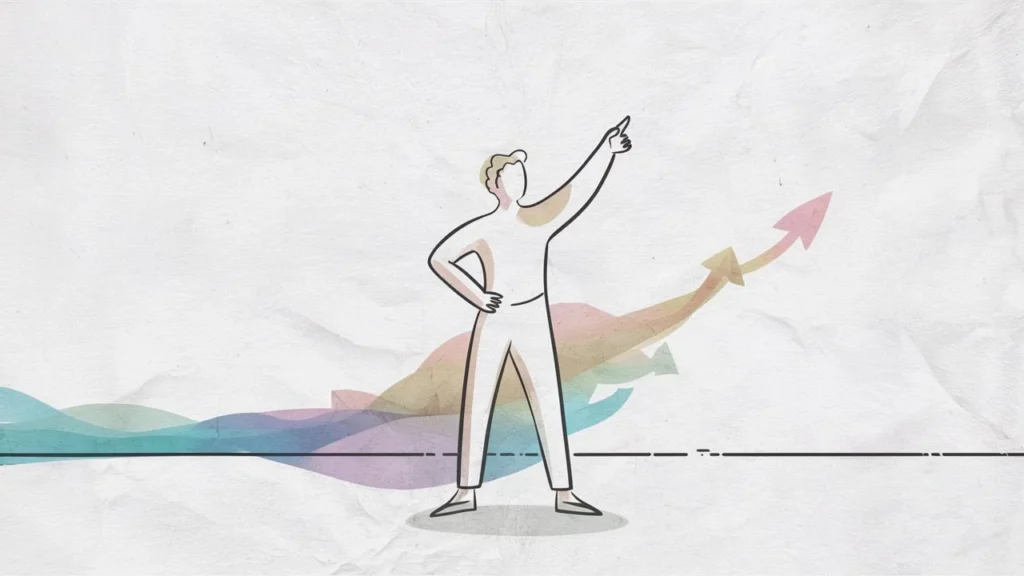
Setting Realistic Goals:
Reaching realistic yet stretching goals serves to build self-efficacy. Extending individuals beyond their usual boundaries enables them to develop the capacity for mastery. Breaking large goals into smaller, manageable steps allows the person an opportunity to build confidence through small, step-by-step successes.
Building Mastery Experiences:
Actively finding and completing tasks that are related to one’s goals is key in building a self-efficacy mindset. Those who do activities in which they are good and who accomplish things can build up mastery experiences. Praising the accomplishments, no matter how insignificant they are, reinforces self-confidence and reinforces the belief in one’s power.
Seeking Support and Feedback:
To build self-efficacy, support from mentors, coaches, or those around you could serve as great tools in giving advice and encouragement. This form of feedback enables learners to pinpoint areas where they can grow and hone their skills. In addition to that, spending time with people around who trust in themselves is key to confidence building.
Visualizing Success:
As for visualization techniques, it means repetitively visualizing success scenarios and mentally picturing how to deal with hardships. One of the ways by which people can reduce anxiety, build confidence, and prepare mentally for success is by visualizing themselves in tough conditions where they do well. The power of visual imagery to strengthen your self-perception and self-efficacy cannot be overemphasized.
Learning from Failure:
Regarding failure as a necessary component of growth is a key step in building self-efficacy. Alternatively, individuals could reinterpret failures as fertile ground for mistakes, which would foster learning and growth. By establishing what the issue was, finding out the lessons learned, and changing the approaches we begin to grow resilience and promote self-efficacy.
Cultivating a Growth Mindset:
A growth mindset, which is centred on the idea of your abilities developing if you put in effort and patience, is a formula for achieving self-efficacy. Adopting difficulties, overcoming defeats, and viewing failures not as errors, but as a chance for growth instill a conviction in someone for their ability to achieve the aim.
Celebrating Progress:
Recognizing and applauding the progress to the extent it is there is equally important for boosting the confidence. Recognizing achievements, setting milestones, and praise for the effort itself create a confident individual with a self-motivated behavior. ‘Positive reinforcement’ not only keeps our concentration and dedication to aims steady, but also helps the long term engagement.
Through incorporating the given tactics into their lifestyles people become able to increase and strengthen their personal efficacy and hence to deal with the challenges, believe in and pursue their goals and succeed with confidence and resilience.
Overcoming Self-Doubt
Curing the idea of doubt leads self-efficacy rise and inspire you to achieve success in several parts of life. Insecurity can be a source of mental power, doubt triggers fail, and they are just an excuse for those aiming the maximum of themselves. Here are some effective strategies for overcoming self-doubt:Here are some effective strategies for overcoming self-doubt:

Recognizing Negative Thought Patterns:
Take your awareness, in the very beginning, of the self-doubting thoughts to find out from where they originate. Direct attention to negative comments that you make to yourself and negative thoughts and beliefs that reduce your level of confidence. Confront your thoughts like this if they are the results of the disregard of the factual information or wrongful point of view that has been taken.
Cultivating Self-Compassion:
To be self-compassionate is to act towards yourself in a way that shows you respect and support. Give frank admissions that everybody experiences self-doubts at times, and it’s fine to get to feel uncertain. Get through this together, create a supportive environment as you would for a friend going through the same things.
Setting Realistic Expectations:
Resist the temptation of putting heightened expectations on yourself based on your inner critic, who may cause you to be self-defeating. Instead, devise easily attainable targets and work their way through them by creating small easy ones. Do highlight your successes rather than just beating yourself on why not yet achieving 100%.
Seeking Support:
Drop in to support a conditional people, you friend’s family members, or mentors who can be sources of motivation and view. Express your worries with persons whom you esteem and you are confident that they will only give you support indented to help you challenge self-doubt. The fact that you are kept in the company of positive influences ensures that you have the right confidence.
Practicing Self-Affirmations:
Use positive affirmations to combat self-doubts and outputs confidence in your abilities. Let your words be your tools. Repeat affirmations like “I am capable” to yourself often and tell yourself you’re confident and you deserve success. Positive statements can be great substitutes for harmful self-talk and build a better self-picture in the process.
Taking Action Despite Fear:
Even though where insecurity originates usually it is about a fear of failure or concerned about being rejected. And when dread seizes you, act upon it even if it feels weird. First, look outside of your comfort zone by taking little steps and increasing your comfort zone gradually. Keenness success after success sanctions confidence and drives away self-doubt.
Focusing on Growth and Learning:
Embracing a growth mindset will make you not to judge all difficulties and failures as the outcomes but see each of them as the process of learning. In place of this interpretation as evidence of your weakness, see in these failures a valuable experience that is a step to your self-discovery and development. Rethink your way from escaping failure to considering it as the inevitable consequence of learning possibilities.
By measuring these initiatives, you will develop the ability to overcome self-unconvince gradually and depend on yourself and your abilities more. While this is hard, you should always remember that getting rid of the doubts about yourself is a journey and it needs patience, persistance and self-love. Apart from believing in oneself, determination can be created every day as you face challenges with resilience. That will make you to not give up and go for the goals you really desire.
Enhancing Self-Efficacy in Different Areas Work and Career
The development of self-efficacy in work and career setting is essential fundamental for professional development, job satisfaction, and overall career success in the work organization. Here are some effective strategies for boosting self-efficacy in this area:Here are some effective strategies for boosting self-efficacy in this area:
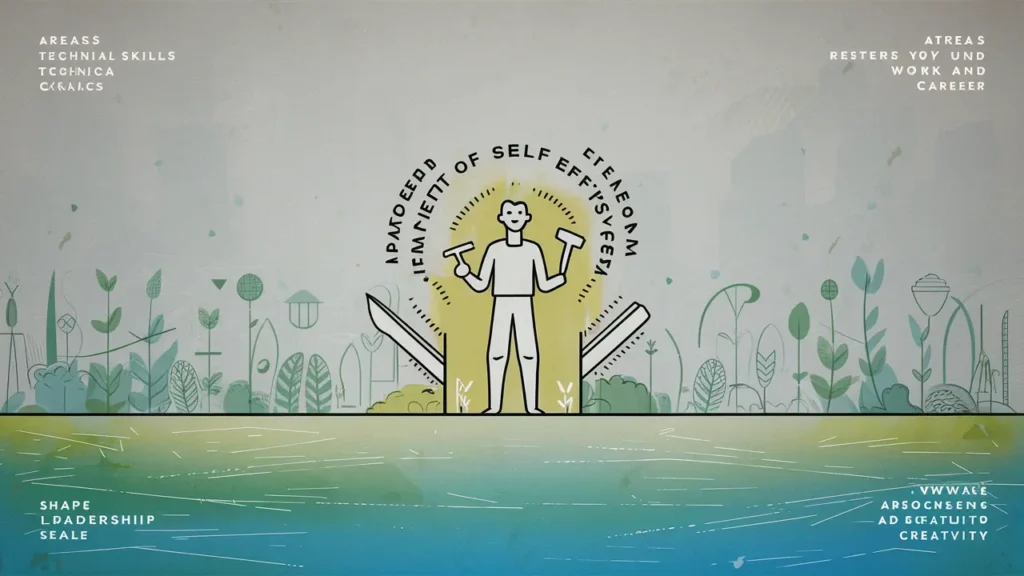
- Setting Clear and Achievable Goals: Specify exact, measurable goals that are appropriate for your career targets and will guide your strategic planning. On a large goal, break it down into smaller action steps, so they become more manageable. Being intentional about defining your goals allows you to have a directional style of operation; this in turn develops self-assurance that either way, you will get to your destination.
- Seeking Skill Development Opportunities: The everlasting engagement in hunting the opportunities to upgrade the skills corresponding to the professional path you choose is greatly recommended. Attend seminar sessions, “how-to” classes, or e-learning lessons to gain new knowledge, and develop competencies. It is an experience where you feel highly confident to take on tasks and duties. You deal with challenges that arise and succeed at what you set out to do.
- Seeking Feedback and Recognition: Take the initiative and ask for their opinions regarding the task assignment given to you. As feedback provides ideas, you can see what needs to be improved so you can sharpen your skills. Noteworthy, appreciate, and glorify your accomplishments and wins as that inspiration nurtures your confidence.
- Taking on New Challenges: Find opportunities to join projects or work on assignments that would challenge you to wipe off any limits of what you think you can do professionally. Stepping ahead into or outside what you are accustomed to or familiar with, doing something new, and encountering challenging situations helps build your confidence level and resilience. When everything you do has value, showing your capacity and initiative in the workplace is the best way to go.
- Building Supportive Relationships: Solidifying relationships and good rapport with supervisors, workmates, and mentors are instrumental for future advancements because they can offer career guidance, support, and encouragement. If you fill your world with supportive people, you’ll have the right atmosphere to develop and make progress. Being part of a team and getting a pat on your back from other members of your peer group will boost your confidence in your abilities. Educational Sport: A Pathway to Success.
- Reflecting on Past Successes: Ponder your past accomplishments and successes of your professional career as a key step on this journey. Keep in mind all the difficult situations you have ever sorted out yourself and the success you had. Leaning onto previous struggle experiences reinvigorates your reasoning in the fact that you can always overcome the hurdles and achieve your goals.
- Maintaining Work-Life Balance: Elicit the aim of keeping work and personal life in check, both could represent a balance. Keep the effort of self-care by exercising, relaxing, and spending time with close people. Enjoy in life by eating with friends, reading novels, or taking a bath, for instance. Living an ideal mix of a healthy life gives you a push to your general wellness and allows you to cope with the challenges you face firmly. This way, you can function at the best of your potential in your professional life.
Through the utilization of these approaches, you will be able to foster and strengthen your level of self-efficacy in both the work and career domains; therefore, keeping you on the right track for sustainable satisfaction and achievement of your professional objectives. Be mindful of the fact that the journey of developing your self-efficacy takes time and effort and that you need to be motivated to see yourself as being capable of virtually anything.
Education
Teachers can build up students’ self-efficacy through the provision of meaningful feedback, the cultivation of a growth mindset, and the provision of an educational environment that encourages trial and error, appreciates potential, and generates extensive learning.
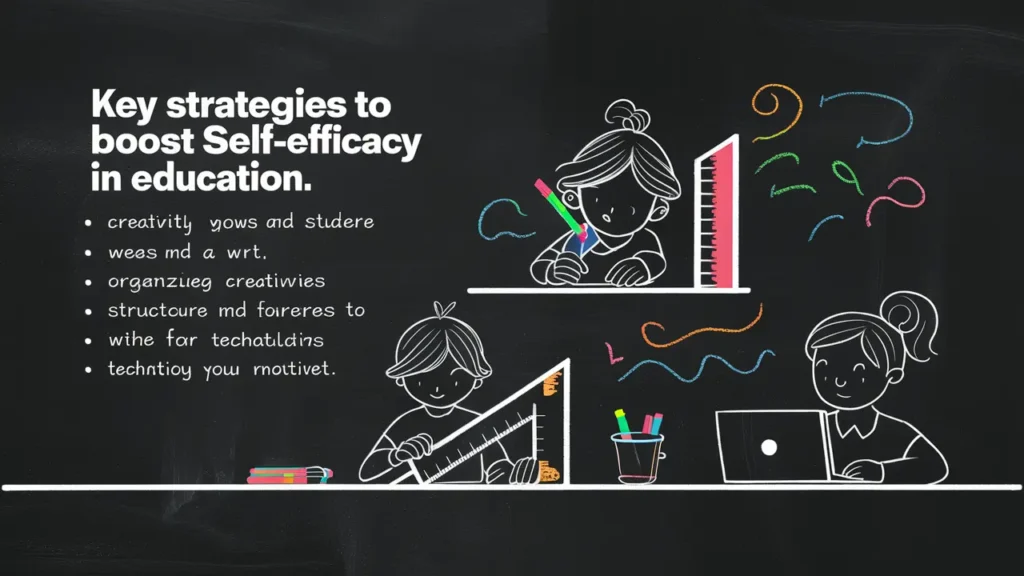
Personal Relationships
In personal relationships, effective communication, empathy, and validation of each other’s abilities can nurture mutual confidence and resilience.
Cultivating Resilience Through Self-Efficacy
Self-efficacy serves as a cornerstone of resilience, enabling individuals to adapt to adversity, persevere in the face of challenges, and bounce back from setbacks stronger than before.
Case Studies and Examples
Examining real-life examples of individuals who have overcome obstacles through self-efficacy can provide inspiration and insights into its practical application.
Measuring Self-Efficacy
Various assessment tools and techniques, including self-report scales, behavioral observations, and performance tasks, are used to measure self-efficacy in research and clinical settings.
Challenges in Building Self-Efficacy
Factors such as fear of failure, external pressures, and imposter syndrome can pose challenges to developing and maintaining self-efficacy, requiring conscious effort and support to overcome.
Future Directions in Self-Efficacy Research
Conclusion
Self-efficacy is a pillar belief upon which self-determination, actions, and final results are built. When one realizes their capacity to do what others think is impossible, he or she can cope with adversities, accomplish different tasks, and make a success out of their lives.
FAQs about Self-Efficacy
Self-efficacy refers to beliefs about one’s capabilities to perform specific tasks, while self-esteem pertains to one’s overall sense of self-worth and value.
Yes, self-efficacy can be developed and enhanced through various strategies such as setting achievable goals, seeking support, and challenging negative beliefs.
Self-efficacy beliefs influence motivation by shaping individuals’ perceptions of their capabilities to succeed, which in turn affects their willingness to exert effort and persist in the face of challenges.
Yes, self-efficacy beliefs are typically domain-specific, meaning that individuals may have different levels of confidence in their abilities across various areas such as academics, work, and relationships.
While high self-efficacy can be beneficial, overestimating one’s abilities without realistic assessment of skills and resources may lead to poor decision-making and potential setbacks.

